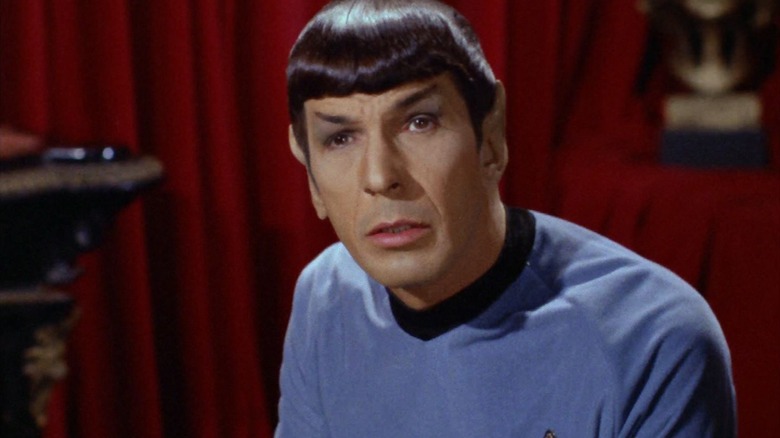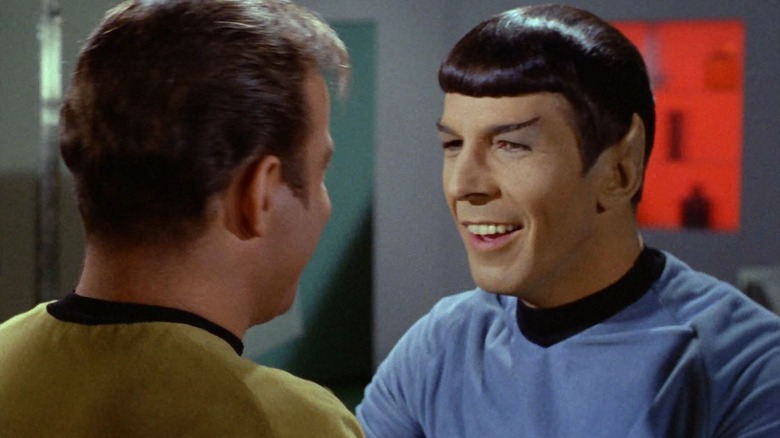Why Leonard Nimoy Was Glad Star Trek Got Canceled
Television historians are familiar with the arc of the popularity of "Star Trek." In its first two seasons (which aired from 1966 to 1968), it struggled to attract a massive mainstream audience. Quietly in the background, however, the series was accumulating a small but passionate cult of science nerds and utopia lovers. When news leaked that CBS was going to cancel "Star Trek" after its second season, a grassroots letter-writing campaign (led by Bjo and John Trimble) barely managed to save it. Of course, its third season wasn't any more popular than the first two, so CBS canceled the series after 78 episodes (79, if you count "The Menagerie" as two parts).
"Star Trek," however, landed a sweet, sweet syndication deal, allowing it to remain in reruns for many, many years. It wasn't until the early 1970s that the show grew from a niche cult sci-fi series into a cultural phenomenon. Fans began to find one another, conventions were held, and creator Gene Roddenberry began to talk about "Star Trek" with the new tide of Trekkies that had just formed. Indeed, I'm personally convinced that Roddenberry didn't fully realize the utopian ideals of his own series until he was on the convention circuit in the 1970s.
Of course, those discussions were had in retrospect, and we can certainly talk all day in the abstract about how "Star Trek" promised a hopeful future for humanity. It's much harder to do so while suffering through season 3 episodes like "Spock's Brain," "The Way to Eden," or the truly awful "Turnabout Intruder," all of which rank among the worst episodes of "Star Trek." While the series may be placid and peaceful, it isn't always good.
Indeed, Spock actor Leonard Nimoy, while happy to see "Star Trek" regain its popularity, once admitted in a Television Academy interview that he'd been relieved when "Star Trek" was canceled. Why? Because he, too, recognized it was slipping in quality.
Leonard Nimoy felt that Star Trek was getting pretty bad by the end
As one might expect, Nimoy was ambivalent about the end of "Star Trek." It was, of course, a lucrative gig for him, but he hated how bad it was. As he put it:
"I had very mixed feelings about it. My concern always was the writing. The writing, the writing, the writing. It's always about the writing. The last year of 'Star Trek,' the writing deteriorated badly. The third season deteriorated badly. I was so glad when it was over. I really was unhappy in that final season. Sad. I was sad. Because I knew what it could be when it was well-written and well-produced, and it wasn't either of those two things."
Nimoy even called out "Spock's Brain" by name. In that episode, an alien species infiltrates the U.S.S. Enterprise and absconds with the titular cranial organ. Spock is kept alive, but his brain is gone. His body is then outfitted with an electronic device that allows friends to walk him around via remote control. Eventually, his brain is found wired into a computer on a nearby alien world (where it's being used to keep the planet's infrastructure running). It's not a good episode.
Nimoy remarked that the new team of producers brought in for "Star Trek" season 3 weren't as attentive as the one before them. "The new producers didn't have a feeling for the show," he explained, "and therefore they couldn't transfer the proper feeling to the writers. And the material they were buying was not good 'Star Trek.'"
Of course, season 3 contains some excellent episodes. ("Is There in Truth No Beauty?" is a highlight.) Overall, though, one can indeed see the budget shrinking (some episodes were filmed in an open black space) and the scripts getting worse in quality. "Star Trek" was rescued by posterity, but it had a lot of dark marks against it on the way there.

